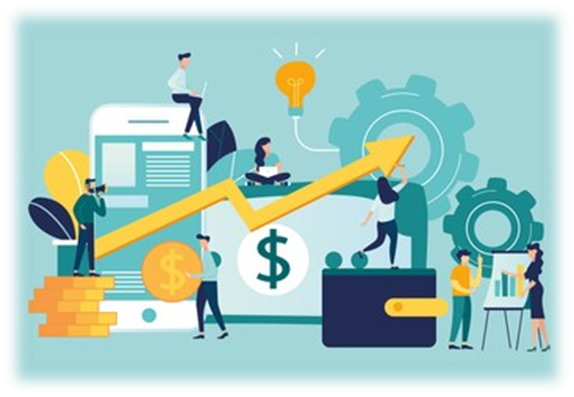By Narayan Giri

Economic development is a positive and qualitative change in production and consumption, the basic activities of the economy. Similarly, qualitative changes in the areas of physical infrastructure, education, health, employment, etc. are also called economic development. A radical change in the productive capacity of the means of production is economic development. In economics, per capita production, per capita income, poverty alleviation, reduction of income inequality, quality of labor force performance, etc. can be called economic development. In this way, economic development includes qualitative changes in the physical and social sectors. Youth have an incomparable contribution to economic development. Even if we look at the history of economic development, today’s developed countries have become prosperous by using the skills, abilities, passion, vigor and intellectual capacity of the youth. Young manpower is the foundation of a country’s valuable economy. If the physical and mental abilities of the youth can be managed in a correct and planned manner, there can be a qualitative change in the overall economy of the country and society. If the creativity, intelligence, science, practicality, entrepreneurship, transparency, accountability, dynamism, changeability, morality, justice, social service spirit and attachment in the youth are properly utilized, the economic development of the country and society can be done easily.
Economic growth usually means that the GDP growth rate exceeds the population growth rate. Making good use of the resources available in the country and making use of external capital and technology is called economic development. If all the people who can work in it are employed, economic development will take place. Likewise, if labor can be increased in productivity, production will increase and economic growth will occur. There is a majority of youth in the total population. Therefore, if the activity of all these youths increases, the country will surely develop. Development requires labor and skills. A large part of the population can be employed by the youth group. There must be a working environment for development in the economy and only economic development is possible.
The state should make the youth active in work, encourage investment and labor through economic policy. In this way, the youth can play an important role in economic development by actively contributing to the country and society through labor and skills. For this, the state should be able to use the youth resources. The increasing proportion of the youth group in the population is very important for the country’s development. Economic development can be done by creating employment on a large scale by using the balanced use of labor, capital and technology in production. The expansion of accessible quality education, skill development, technical education, training, etc. will have a positive impact on the productivity of labor and create widespread employment. Through vocational education and training, employment can also be created by connecting labor to production work. Productivity growth and employment contribute significantly to economic development.
Young people can transform the country by spending their skills, abilities and labor. The country where the youth manpower is mobilized in a correct, systematic and scientific manner, it is found that the country has rapid economic development and prosperity. Youth power has a unique ability to build a new society and structure. Prosperity can be achieved through the overall development of agriculture, tourism, energy, water resources and other infrastructure, etc. through the youth workforce.
Sustainable development and Millennium Development Goals have also accepted that economic development is impossible without the active participation of youth. Therefore, qualitative development can be achieved in the financial sector, education, health, agriculture, infrastructure, tourism, industry, business, etc. through the excessive use of the overall potential of the youth. Young people who excel in education can contribute to economic development. Youth can play a role in solving economic problems such as poverty, inequality and unemployment based on their experience and knowledge of national and international economic development.
Youth participation in economic development can be increased through arrangements to create jobs for the youth at home, increase self-employment opportunities, subsidized loans for the development of entrepreneurship, etc. If the youth can be mobilized in the development of entrepreneurship based on natural resources, agriculture, water resources, tourism, forest and herbs, minerals, etc., the economic level of the country can increase rapidly. For this, the state should create a comfortable environment for youth mobilization.
If the passion, energy and new ideas of the youth are used in productive economic activities, the economy will go on the path of prosperity. The youth are economic and social managers. The ability of the youth can be mobilized through encouragement and can be made a positive conductor for the society and the country. It is the need of the day to make proper use of resources through the potential of the youth. Economic development and prosperity cannot and should not be talked about in a country without youth mobilization. For this, the state should make a certain policy. Positive thinking can be developed in the youth through education for human development, the concept of economic acquisition and utilization, socio-political access, exposure of competence, socio-cultural values, etc.
In this way, if the youth is mobilized through education, training, security, tourism, etc. and used in economic activities, then the economy of the country will become stronger. By providing jobs and necessary opportunities to the youth, after appreciating their abilities and skills, it contributes significantly to economic development. Skilled, unskilled and semi-skilled youth in the country should be integrated and mobilized in production. The capacity of the youth should be increased and they should be made to participate in entrepreneurship and economic and social transformation. By doing this, the economy becomes stronger. Then the income increases and the standard of living of the people improves. This leads to overall economic development.
Young manpower is mostly educated, full of technical skills, full of positive thinking, entrepreneurial mindset, practical and business skills, and with their activism, necessary infrastructures can be developed for the modernization and commercialization of agriculture. In the same way, the activation of youth power is indispensable for the long-term solution of unemployment and poverty, which are the main problems of economic development. After the youth are initiated through the practical, professional, high technology based education system and the correct and scientific management of the overall resources of the country, there will be a positive change in the capital formation process and it will play an important role in alleviating unemployment and poverty. Similarly, labor, capital, land, etc. are required for industrial development. This work is impossible without the active participation of youth.
Development infrastructures include electricity, drinking water, education, health, roads, transportation, communication, etc., and economic development occurs when there are positive changes. Young people can contribute in all aspects in this field as well. In order to do all these things, programs such as subsidized and interest-free loans, subsidies, technical and skill-based education, work according to ability, investment in the youth sector, motivation for youth in productive work, self-reliance in indigenous employment, etc. should be conducted. After this, it is certain that the entire youth workforce will contribute to economic development in general by using their skills, abilities and competencies in the overall development of the country and society.


Leave a comment